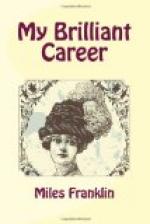“Bad-tempered is a tame name for it. You should have seen the dust he raised the other day with old Benson. He just did perform.”
I was always hearing of Harold Beecham’s temper, and wished I could see a little of it. He was always so imperturbably calm, and unfailingly good-tempered under the most trying circumstances, that I feared he had no emotions in him, and longed to stir him up.
Grannie greeted me with, “Sybylla, you are such a tiresome girl. I don’t know how you have packed these hampers, and we want to have lunch. Where on earth have you been?”
Miss Augusta Beecham saluted me warmly with a kiss, and presented me to her sister Sarah, who also embraced me. I went through an introduction to several ladies and gentlemen, greeted my acquaintances, and then set to work in dead earnest to get our provisions laid out—the Five-Bob Downs party had theirs in readiness. Needless to say, we were combining forces. I had my work completed when Mr Beecham appeared upon the scene with two young ladies. One was a bright-faced little brunette, and the other a tall light blonde, whom, on account of her much trimmed hat, I recognized as the lady who had been sitting on the box-scat of the Beecham drag that morning.
Joe Archer informed me in a whisper that she was Miss Blanche Derrick from Melbourne, and was considered one of the greatest beauties of that city.
This made me anxious to examine her carefully, but I did not get an opportunity of doing so. In the hurry to attend on the party, I missed the honour of an introduction, and when I was at leisure she was sitting at some distance on a log, Harold Beecham shading her in a most religious manner with a dainty parasol. In the afternoon she strolled away with him, and after I had attended to the remains of the feast, I took Joe Archer in tow. He informed me that Miss Derrick had arrived at Five-Bob three days before, and was setting her cap determinedly at his boss.
“Was she really very handsome?” I inquired.
“By Jove, yes!” he replied. “But one of your disdainful haughty beauties, who wouldn’t deign to say good-day to a chap with less than six or seven thousand a year.”
I don’t know why I took no interest in the races. I knew nearly all the horses running. Some of them were uncle’s; though he never raced horses himself, he kept some swift stock which he lent to his men for the occasion.
Of more interest to me than the races was the pair strolling at a distance. They were fit for an artist’s models. The tall, broad, independent figure of the bushman with his easy gentlemanliness, his jockey costume enhancing his size. The equally tall majestic form of the city belle, whose self-confident fashionable style spoke of nothing appertaining to girlhood, but of the full-blown rose—indeed, a splendid pair physically!
Then I thought of my lack of beauty, my miserable five-feet-one-inch stature, and I looked at the man beside me, small and round-shouldered, and we were both dependent children of indigence. The contrast we presented to the other pair struck me hard, and I laughed a short bitter laugh.




